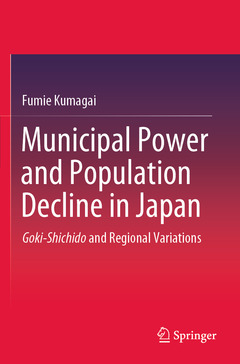Description
Municipal Power and Population Decline in Japan, 1st ed. 2020
Goki-Shichido and Regional Variations
Author: Kumagai Fumie
Language: English
Subjects for Municipal Power and Population Decline in Japan:
Keywords
Municipal Power; Revitalization of municipalities; Goki Shichido; Demography and family sociology in Japan; Declining population in Japan; The Five Home Provinces and Seven Circuits; Small area analysis; Population aging and falling fertility; Genkai Shuraku; Marginal Village; Population-sustaining power; Household type and marriage power; Regional Revitalization Law of 2014; Aging and Social Policies; Community Network
Publication date: 08-2021
288 p. · 15.5x23.5 cm · Paperback
Publication date: 08-2020
Support: Print on demand
Description
/li>Contents
/li>Biography
/li>Comment
/li>
This book provides an insightful sociological study of the declining Japanese population, using statistical analysis to establish the significance of municipal power using demographic data on national, regional, prefectural and municipal levels. Penned by one of Japan's eminent sociologists, it provides a quantitative characterization of population decline in Japan with a focus on regional variation, and identifies the principal explanatory factors through GPI statistical software tools such as G-census and EvaCva, within a historical perspective. Furthermore, it offers a qualitative assessment of what constitutes ?municipal power? as this relates to regional/local revitalization as a means of addressing municipal population decline. Using Goki-Shichido as a theoretical framework, this book pays special attention to municipal variations within the same prefecture, presenting a completely unique approach. In combining these two dimensions of analyses, the book successfully reveals the impact of municipal power and socio-cultural identity of social capital in the region, from both quantitative and qualitative perspectives at the municipal level. Demography issues in Japan have been receiving increasing attention among researchers given the growing number of declining populations in developed countries, in tandem with rapid aging and low fertility trends. Providing an original and unique contribution to regional population analysis in the fields of regional demography, historical demography and regional population policy, this book shows that the revitalization of the community is vital if Japan is to increase its population, so as to renew a community ?raison d'être?. The book is of interest to scholars of Asian studies more broadly, and to sociologists, demographers, and policymakers interested in population studies, specifically.
"Providing an informative and vivid overview of the demographic situation of Japan, the author offers excellent suggestions for effective regional policy in confronting a shrinking society. This book presents a unique analysis of the regional variations on small municipal levels, with demographic variables, social indicators and historical identities.?An original contribution to regional population analysis in the fields of regional population policy, regional demography and historical demography."
- Toshihiko Hara, Professor Emeritus, Sapporo City University
Chapter 1: Issues and Theoretical Framework.- Chapter 2: Methodology.- Chapter 3: Population-Sustaining Power and Marriage Power by Prefecture and by Municipality in 2013, 2040, and 2045 (Projected).- Chapter 4: Tokyo and Aichi Prefectures in Tokaido of Goki Shichido and Their Municipal Power.- Chapter 5: Small but Lively Municipalities Taking Advantage of Closeness to Central Cities in Western Japan: Ryukyu, Saikaido, and Kinai.- Chapter 6: Successful Municipal Revitalization in Devastated Communities in Eastern Japan: Some Examples from Aomori and Yamagata Prefectures in Tosando.- Chapter 7: People in a Small Municipality and on a Remote Island Connect Online to the Outside: Some Examples in Sannindo and Nannkaido.- Chapter 8: Conclusion: What Can Be Done Before the Municipality “Disappears”.- Indexes.
The first book to employ Goki-Shichido as a theoretical framework for the analysis of municipal power and regional revitalization in Japan
The first book to identify "marriage power" as a significant factor in population sustainability, authored by one of Japan's eminent sociologists
Highlights elements of municipal power, both positive and negative, as the driving force for community revitalisation, and recommends new policies at the municipal level




